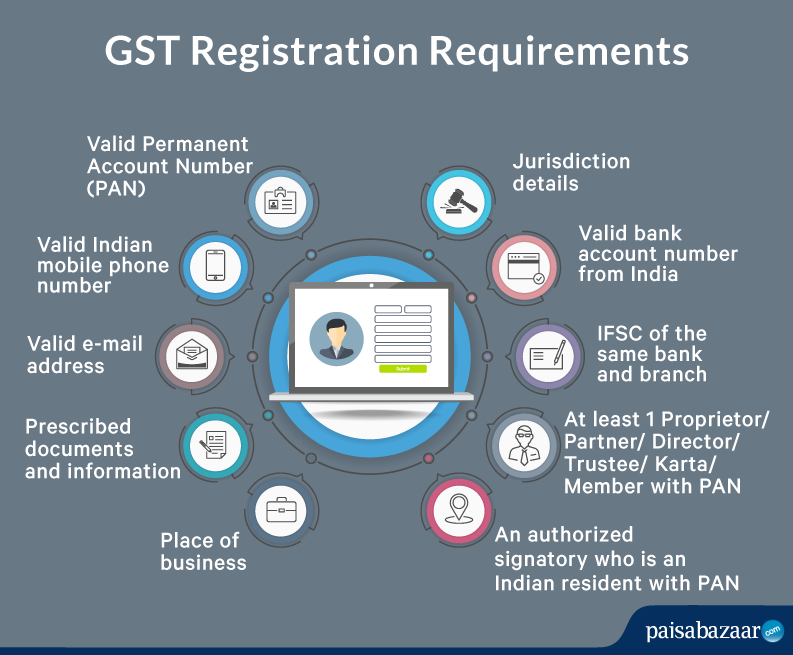Making Best Use Of Tax Obligation Performance: Professional Tips on Navigating the GST Registration Labyrinth for Tiny Businesses
Navigating the elaborate landscape of Goods and Provider Tax Obligation (GST) registration can be a labyrinthine task for small companies intending to optimize their tax obligation efficiency. Comprehending the eligibility criteria, thorough documents demands, tactical timing considerations, and experienced enrollment process tips can significantly influence a business's financial standing. Conformity with GST guidelines is vital, and adhering to best techniques can enhance procedures and avoid potential challenges. In this conversation, we will certainly check out professional insights and actionable advice that can equip small companies to browse the GST enrollment labyrinth efficiently and enhance their tax performance.
Qualification Criteria
Qualification needs for Small Business GST Registration encompass particular requirements that organizations must fulfill to abide with tax guidelines. To certify for GST enrollment, a business must have an annual turn over going beyond the limit set by the tax authorities, which differs by nation.

Documentation Needs
The needed documentation commonly consists of proof of organization registration or identification, unification and address proofs of the service proprietor, photographs, financial institution account details, and proof of the principal area of organization. Additionally, companies need to supply information of their service tasks, consisting of the goods or services supplied.
Maintaining all needed paperwork organized and easily easily accessible can enhance the enrollment process and assistance services conform with the needs effectively. Precise focus to detail and adherence to the documentation standards are essential for a successful GST enrollment procedure for tiny organizations.
Timing Considerations
Considering the crucial paperwork needs have been diligently dealt with, the following crucial facet for small companies starting the GST registration procedure is the strategic administration of timing factors to consider. Timing plays a critical duty in GST enrollment, affecting not just conformity but likewise economic aspects of business. Local business need to very carefully plan the timing of their GST registration to make the most of advantages and decrease potential risks.

In addition, businesses should straighten the timing of their GST enrollment with their functional readiness. Sufficient preparation, such as upgrading audit systems and training personnel, is necessary to perfectly integrate GST requirements right into day-to-day operations. By article strategically handling timing considerations, small companies can navigate the GST registration procedure effectively and enhance their tax performance.
Enrollment Process Tips
Efficiently browsing the GST registration process calls for little companies to implement strategic and aggressive enrollment process tips. One critical idea is to guarantee all essential papers are readily offered before beginning the registration procedure. This consists of company enrollment papers, proof of address, financial institution statements, and recognition proofs of business proprietors. Verifying the precision of the info provided is similarly important to stop denials or delays.
In addition, comprehending the limits and requirements for GST registration based upon the specific state or region where business operates is crucial. Some states have different turnover thresholds that trigger mandatory enrollment, so being notified regarding these limits can aid businesses intend ahead.
Another valuable idea is to take into consideration looking for professional assistance from accountants or tax specialists that concentrate on GST enrollment. Their competence can enhance the procedure, decrease errors, and guarantee compliance with all policies.
Compliance Best Practices
Navigating the GST registration process smoothly demands not just critical enrollment procedure ideas however likewise persistent adherence to compliance best practices to make certain recurring governing positioning. Local business should prioritize compliance to avoid fines and keep a great standing with tax authorities. One important best practice is to maintain comprehensive and precise records of all purchases. This consists of billings, receipts, and other financial documents that might be needed for tax audits or compliance checks. In addition, remaining notified about any kind of updates or changes to GST laws is important. Local business proprietors ought to frequently assess government guidelines and seek professional advice if required to guarantee they are meeting all requirements. It is additionally suggested to submit GST returns on time to avoid late costs and penalties. By including these compliance finest techniques into their operations, small companies can browse the complexities of GST registration with self-confidence and performance.
Conclusion
In conclusion, like this local business can browse the GST enrollment labyrinth by guaranteeing they meet qualification criteria, collect needed paperwork, think about timing implications, comply with registration procedure pointers, and comply with compliance best methods. By taking full advantage of tax obligation efficiency with appropriate GST registration, companies can boost their economic management and procedures.
Navigating the complex landscape of Product and Solutions Tax (GST) registration can be a labyrinthine task for little businesses intending to maximize their tax performance.Qualification requirements for Small Business GST Registration incorporate specific requirements that services have to meet to conform with tax laws. The required documentation generally consists of evidence of business enrollment or incorporation, address and identity evidence of the organization owner, photographs, financial institution account information, and evidence of the primary area of service. In addition, organizations require to give information his response of their business activities, consisting of the goods or services provided.Effectively browsing the GST registration process needs tiny organizations to carry out strategic and positive enrollment procedure ideas.